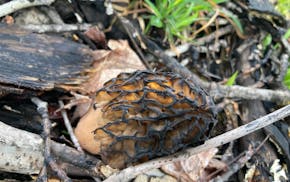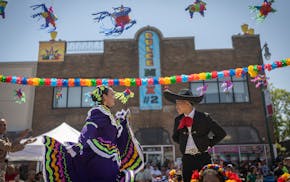Opinion editor's note: Strib Voices publishes a mix of guest commentaries online and in print each day. To contribute, click here.
•••
For years, El Nuevo Rodeo, my vibrant three-story Latino nightclub in the Odd Fellows building on East Lake Street, pulsed with music and life. Overseeing the late-night energy and ensuring its safety was a cadre of off-duty police officers that worked hand in hand with the in-house security team I ran. Minneapolis police Sgt. Frank Kutz first managed this operation on an off-duty basis in 2003 and soon brought in Derek Chauvin as his trusted second. It wasn't long before Chauvin took the reins, reporting directly to me.
A decade later, the Minneapolis city licensing department, in what felt like a targeted campaign against minority-owned establishments, moved to revoke my liquor license. It seemed the system was designed to set us up to fail, and El Nuevo Rodeo was next on the chopping block. Yet, Chauvin and Kutz stood by me, their courtroom testimony proving pivotal in a judge's decision to rule in my favor. In many ways, their support during that critical time paved the way for the continued success that El Nuevo Rodeo enjoyed for the last 10 years of its existence, before the four-story building was to succumb to the Minneapolis fires in May 2020, caused by Chauvin's actions as a Minneapolis police officer in the murder of George Floyd. There were nine businesses in the elegant, historic Odd Fellows building on the corner of 27th and Lake, and five of them were mine.
Within the walls of El Nuevo Rodeo, I witnessed a side of Chauvin that seemed to appreciate the Latino culture and its people. I recall his consideration for undocumented patrons, a quiet understanding that a minor bar fight shouldn't lead to deportation. "He's got a family," he'd say, suggesting a brief scare in the squad car was sufficient punishment. Over late-night tacos at the club's taqueria, he'd listen intently as I recounted the evening's events, a soft-spoken presence even amid the chaos of promoters, artists and inebriated guests. At times, I even perceived a certain sweetness in his demeanor.
Yet, a disquieting undercurrent existed. Whispers of abusive behavior by my off-duty officers after particularly hectic weekends reached me, and I confronted Chauvin directly. El Nuevo Rodeo was a sanctuary for Latinos, a place where they felt at home and secure, and his role was paramount in upholding that safety — a responsibility shared with my in-house security team, which included Floyd.
Beyond the club's walls, a darker narrative of Chauvin began to emerge. Rumors painted a picture of a South Side bully, a figure leading a "police gang" with apparent impunity. I couldn't help but wonder if this relatively petite, seemingly unassuming man sought the badge to fulfill some kind of need for dominance.
There were instances at El Nuevo Rodeo, in the chaos of the after-bar scene that piled out onto the sidewalks in front of the club, when I personally witnessed Chauvin's callousness toward my patrons. I remember seeing him use the same knee restraint on my people that ultimately took Floyd's life. While the potential for such a tragic outcome didn't register then, I distinctly recall telling him to get up off of my patrons, that it was enough. And he always complied with my direct orders. That is the detail that haunts me — the thought that if I had been there, maybe I could have saved Floyd. Derek would have listened to me.
I recognized that vacant, almost detached stare on Chauvin's face in the video as he fatally pressed his knee into Floyd's neck. I had seen it before; I'd witnessed his seeming descent into a psychotic yet strangely calm, emotionless state when he was inflicting pain on a detainee. Did he derive pleasure from the power to subjugate others, especially big men, Black men? My intuition tells me yes. Looking into that blankness, I search for any trace of humanity, empathy or compassion in that small, broken man.
In the later years of El Nuevo Rodeo, I began hosting Black club nights, seeking to provide a space for a community whose own venues had been systematically shut down by the city. Chauvin informed me that none of his officers wanted to work the Black nights, only the Latin nights. He seemed to imply himself as well, underscoring the complex and troubling layers of the man I once knew. Little did I know that he was ultimately going to embody the rampant police brutality and racial injustice that was happening in our city.
•••
The Floyd seen in the video of his murder is not the man I knew. The George I knew was quiet, sweet and gentle, greeting everyone at the club with a welcoming smile. For me, it was always, "How you doing, superstar?" and a big bear hug.
The morning after Floyd's murder, my girlfriend — a Peruvian woman to whom Chauvin had taken a particular liking — called. She'd sent me Darnella Frazier's video. "That's Chauvin," she said, "and … isn't that your security guard?" My denial — "No, that's not him" — crumbled. It was Chauvin. But it couldn't be Floyd — "Chauvin wouldn't harm one of our own," I thought. I didn't recognize the man those abusive cops had reduced him to, there on the ground: a dehumanized, crying, panicking man facing his last breaths in desperate anguish, pleading for his life. That couldn't be Big George, but it was.
In Floyd's eyes I could see the soul of the Africans who built this country, people who survived the horrific brutality of the slave trade — often at the hands of men just like Chauvin — through sheer determination. He embodied the strength, dignity and pain of his ancestors with a soft wisdom. Despite his imposing stature, he was a gentle man. He wasn't the security guard you'd send to break up a fight; he abhorred violence. He was a lover, not a fighter, and I knew him as a father, boyfriend, employee, brother, son and my friend. A big, kind, beautiful Black man. He was loved. His life mattered.
This May 25, on the anniversary of his death, please don't remember Floyd as he appeared in that video. Remember him as loving, peaceful and always ready to greet you with a smile and a hug. That was the real George.
When those police came at you that day, George, you knew you were in the shadow of justice, and that you would die there. You called it. What you could have never imagined was that your death at the hands of those police officers would bring about such a profound reckoning with race and justice in our city — and the world. You didn't die in vain, my friend. You changed the world. On this fifth anniversary of your death, rest in power.
Maya Santamaria is a Mexican-American anthropologist and entrepreneur. She was the lead singer of the Twin Cities-based salsa orquestra Sabor Tropical for a decade until opening El Nuevo Rodeo Nightclub and Restaurant in 2003. She is the author of "Música de La Raza: Mexican and Chicano Music in Minnesota" (1999 Minnesota Historical Society Press). She now owns KMNV La Raza 95.7 FM and 1400 AM and KMNQ Amor Radio Minnesota 1470 AM, Spanish-language radio stations in the Twin Cities, and is CEO of La Raza Marketing Agency.
Opinion: Five years later, why Derek Chauvin killed George Floyd is still unknown

Brown: How little fish and secret mushrooms can salve Minnesota's culture wars
Opinion: I knew George Floyd and Derek Chauvin

